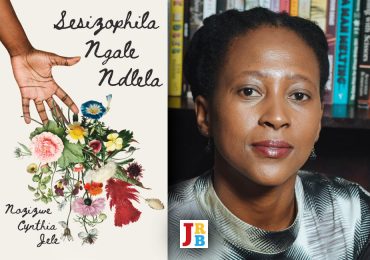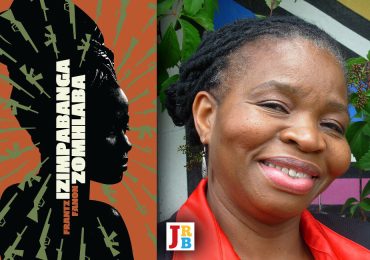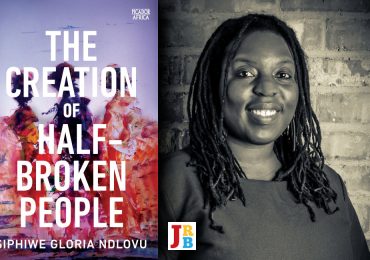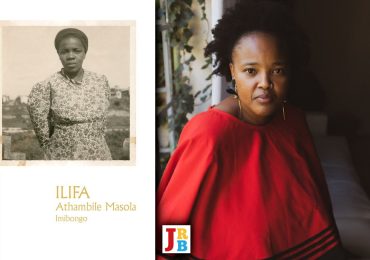Ghanaian author Peace Adzo Medie chatted to The JRB about writing, reading and her debut novel His Only Wife.
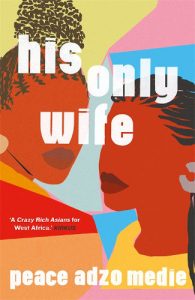
His Only Wife
Peace Adzo Medie
OneWorld, 2021
Proust Questionnaire with Peace Adzo Medie
The JRB: What are you most excited about people discovering in His Only Wife?
Peace Adzo Medie: The character Afi. A young woman in a difficult marriage who wants to be respected and wants her voice to be heard.
The JRB: What question do you think readers are going to ask you the most?
Peace Adzo Medie: Is the story autobiographical or based on someone I know? No, it isn’t.
The JRB: Would you share one of your favourite paragraphs from the book and let us know why you love it?
Peace Adzo Medie:
Eli broke into a smile that reached his eyes when he saw me. He was leaning against the doorframe like someone who had been waiting for a long time to be let in.
‘Please, good afternoon,’ I managed to say in a near whisper. Should I shake his hand, should I hug him, a kiss on the cheek? Last night I had imagined hugging him but now no greeting seemed right for this almost-stranger who was also my husband. It didn’t help that he was jauntily leaning against the doorframe and openly staring at me, his smile intact.
‘Afternoon, Afi,’ he said, his eyes never leaving my face. I lowered my eyes to look at my hands, and then my feet. Anything to avoid the intensity of his gaze.
‘Please come in, Fo Eli,’ I heard my mother say from somewhere behind me. Only then did he look past me into the flat.
I breathed a soft sigh of relief and stepped aside to let him in.
It’s the second paragraph on page 71 and it is the scene where Afi meets her husband, Eli, for the first time, after they’ve been married for several weeks. It captures the awkwardness of their relationship and shows Afi’s struggle to relate to the ‘almost stranger’ who is also her husband. She struggles to make eye contact with him and whispers her reply to his greeting. The scene illuminates the power disparity in their marriage, a disparity that shapes their entire relationship.
The JRB: What was the most difficult scene or chapter to write?
Peace Adzo Medie: The final chapter was the most difficult because I had multiple ideas for how the book would end and I liked all of the versions to some degree. It was therefore hard to choose one.
The JRB: What was the most exciting part of the publishing process?
Peace Adzo Medie: The most exciting part has been hearing from readers about how much they’ve enjoyed the book and how the story has resonated with them.
The JRB: If you could co-author a book with anyone, living or dead, who would you choose and what would it be about?
Peace Adzo Medie: My great-grandmother. She was an incredible woman, very entrepreneurial and a key player in traditional leadership in Ho, Ghana. She lived an amazing life and I wish I had met and interviewed her and co-authored her life story.
The JRB: What’s the best music to write to?
Peace Adzo Medie: I never listen to music when writing. I find it distracting.
The JRB: What habit distracts you most from writing?
Peace Adzo Medie: Browsing the internet. I visit news websites too often in the day.
The JRB: What books do you currently have on your bedside table?
Peace Adzo Medie: Rainbow Milk by Paul Mendez, and Insurgent Empire: Anticolonial Resistance and British Dissent by Priyamvada Gopal.
The JRB: After readers have read your book, what should they read next?
Peace Adzo Medie: The Hundred Wells of Salaga by Ayesha Harruna Attah.
~~~
Read the excerpt:
‘They are not going to throw you into a bush,’ my mother had said when I wondered aloud about where I would call home in Accra. I rolled my eyes at her response when her back was turned. My concerns temporarily receded the next day in Accra when the car drove through high metal gates, manned by two uniformed security guards, and stopped in a parking space in front of an eight story apartment building. Seated in the back seat with my mother, I gasped at the sight of the white structure with its sliding windows and doors on each floor, which reflected the sunlight and caused the building to sparkle. I could see identical lawn furniture and potted plants neatly arranged on the covered balconies of the lower level flats. Beside us in the parking lot were an assortment of gleaming cars. A generator, which I would later discover was the size of a small house, hummed behind the building. Two men watered a lawn so green that I doubted its naturalness. The leaves of young palm trees, planted in the grass and perfectly spaced so that they looked like soldiers with elaborate headdresses on guard duty, rustled in the gentle breeze.
‘Welcome, Madam,’ someone said, breaking my trance and causing me to shut my mouth, which had been hanging open. It was a young man in a brown-and-yellow uniform.
‘Thank you,’ I mumbled, still enthralled by what I was seeing. I remembered that my mother was with me and turned to check on her. She had stuck her head out of the car window and craned her neck to look up at the structure in front of us. I left her to gawk and climbed out of the car. The driver had already opened the trunk and was removing our bags, which our greeter stood at the ready to collect. I picked my handbag off the seat and hung it on my shoulder and moved to help them with the bigger bags.
‘No, Madam,’ the man exclaimed, and grabbed the nearest suitcase to keep me from taking it.
‘He will carry them,’ the driver said.
The man nodded vigorously and reached for a second bag. I backed away.
‘Fo Driver!’ my mother called, she had climbed out of the car and was now standing beside us. ‘Is this where we are going to stay?’ she asked the man who everyone, except the Ganyos, called Brother Driver. His name was Charles and his family’s house was less than a ten-minute walk away from ours in Ho. Charles nodded, his lips quivering in an effort to avoid breaking into a broad smile and his eyes purposely not connecting with ours. He obviously noticed and was amused by our reactions; he had probably come here many times before. Besides, he spent most of his day in Aunty’s house in Ho, which was quite majestic though it did not reach as high up in the sky as this one.
‘He will show you the way,’ Charles said to me, pointing to the man who had begun rolling away one of my suitcases while balancing a second on his head. A second man had appeared and was rolling away a third suitcase.
‘Are you not coming?’ I asked Charles, suddenly alarmed. Was he planning on simply leaving us here and driving away?
‘I have to go back, Aunty is waiting, but Fo Richard is coming,’ he told me. He had set the last of our belongings on the pavement that ran the perimeter of the building.
‘Okay, thank you,’ I said as he shut the trunk.
‘May God go with you,’ my mother said to him.
‘Stay well,’ he replied.
Charles began to drive away just as Richard’s white Range Rover entered the compound and pulled into the parking space that Charles had vacated.
‘Mia woezor,’ Richard called as he came toward us, his arms opened wide. He wore dark blue jeans and white leather loafers, which I imagined would feel like a baby’s skin to the touch, and an unnecessarily tight polo shirt that revealed everything, including his obscenely protruding bellybutton. He hugged my mother and then me.
‘How was the trip?’ he asked as he picked up my mother’s traveling bag.
‘Oh no, please leave it, Fo Richard,’ my mother protested, too rattled to answer his question.
‘Let me carry it,’ he said, brushing aside her protest and walking in the direction in which the men had taken the other luggage. We began to follow him. Behind his back my mother turned to me and formed a silent ‘Hehn?’ with her mouth. Like me, she was in awe of it all, including Richard Ganyo carrying our bag. I broke into a grin and grabbed her arm. I was excited.
We entered the foyer and the girl behind the curved security desk rose and greeted Richard. He responded in a way that told me he came here often, and then he poked one of the buttons on the wall beside the silver lift doors. My heart skipped a beat; I had never been on a lift before. I hoped that I wouldn’t embarrass myself in front of Richard and this girl who had a wide smile on her face though I suspected she was laughing on the inside at our awkwardness. I got the feeling that my arrival had been extensively discussed by the staff. When the lift doors opened, I held my mother’s hand and pulled her inside to stand behind Richard. We both held on to a hip-level iron bar on the wall, expecting the movement of the machine to rock us. The opposite wall had a mirror so that we could see our reflections. I still had on the weave from the wedding but had tied it back in a ponytail. I had wanted to wear jeans and a flowery off shoulder top for the trip but had decided against it. I was not sure about where we would be going and who would be meeting us. So instead I had worn a simple pleated dress that I had sewn with batik my mother had bought me last Christmas, and flat sandals with crystal-like baubles on the straps; they had been in one of the suitcases the Ganyos gave me. My mother had on one of her good kabas and her wig from the wedding. Just as the lift pinged, I met Richard’s eyes in the mirror and we both smiled; me because I had successfully ridden in my first lift, and him, I assume, because he was happy to be showing me my new home.
~~~
- Peace Adzo Medie is a Ghanaian writer and Senior Lecturer in Gender and International Politics at the University of Bristol. The author of Global Norms and Local Action: The Campaigns to End Violence Against Women in Africa (Oxford University Press, 2020), she holds a PhD in Public and International Affairs from the University of Pittsburgh and a BA in Geography from the University of Ghana. She was born in Liberia.
Publisher information
‘Elikem married me in absentia; he did not come to our wedding.’
Afi Tekple is a young seamstress in Ghana. She is smart; she is pretty; and she has been convinced by her family to marry a man she does not know. Elikem Ganyo is a wealthy businessman whose mother has chosen Afi in the hope that she will distract him from his relationship with a woman his family claim is inappropriate.
Marrying a stranger seems a small price to pay in exchange for financial security for her family and the lifestyle she’s always wanted in Accra, Ghana’s gleaming capital, a place of wealth and sophistication. But when Afi arrives in the city, she realises her fairy-tale ending might not be all she had hoped for. Her days are spent with nothing to do but cook meals for a man who may or may not turn up to eat them.
Can she really live this life without losing sight of herself?
Bursting with warmth and humour, His Only Wife is a witty, smart and moving novel about a brave young woman and her search for independence in a man’s world, and the rules she just might have to break along the way.

